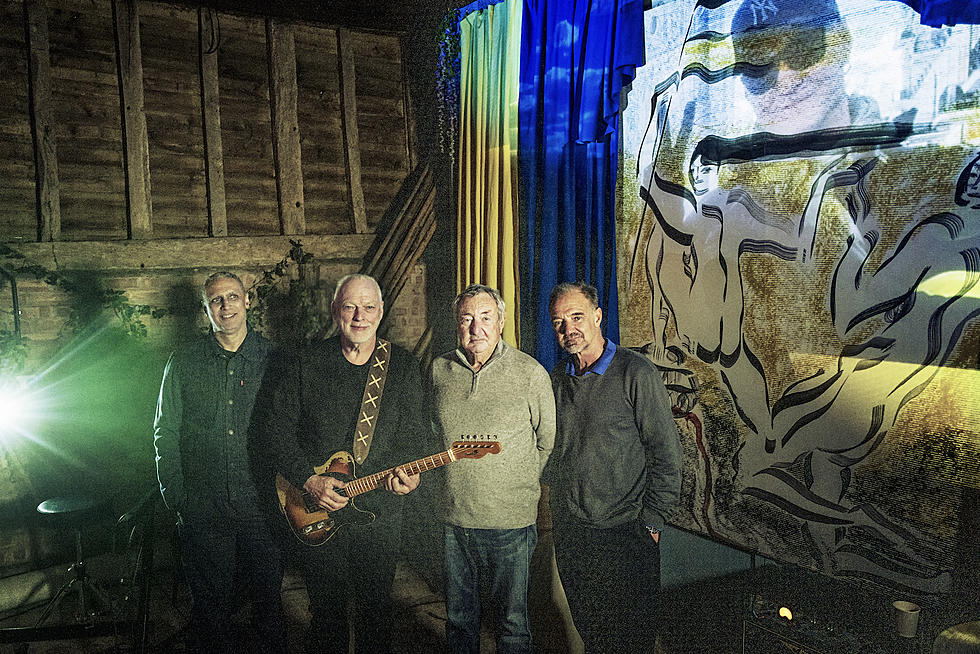
Great Gigs With This Guy: David Gilmour’s Top 10 Guest Turns
If David Gilmour never joined Pink Floyd, he still would have had an immense impact on popular music.
Known for both economical lead work and extravagant sonic explorations, Gilmour rose to fame as a collaborator and foil to Roger Waters, but he has also collaborated with friends, peers and surprising artists such as Paul McCartney, Kate Bush and Pete Townshend.
Since then, ongoing disagreements have dimmed hopes for another Pink Floyd reunion. But, as the below list of David Gilmour's Top 10 Guest Turns shows, he doesn't always need Waters to make magic.
“The Game”
From: Roy Harper's HQ (1975)
Roy Harper was always more popular with fellow musicians than with the mainstream (see Led Zeppelin’s "Hats Off to [Roy] Harper"). He became tightly linked with Gilmour and Floyd after singing lead on “Have a Cigar,” then recruited his pal to help out on numerous albums. The most Floyd-meets-Zeppelin moment, which actually sounds a lot like the Who, came on the complex, 14-minute epic “The Game.” Harper handles vocals; Gilmour charges through, with his electric guitar reaching full volume and maximum force on the crescendo, while bassist John Paul Jones thumps out the low end.
“No More Lonely Nights”
From: Paul McCartney's Give My Regards to Broadstreet (1984)
Pink Floyd played pop music, according to the broadest definition of the term (they made music that was extremely popular). But McCartney's tight, tuneful little nuggets usually feel like a world away from “Echoes,” the 24-minute jam/space opera that filled side two of Meddle. On “No More Lonely Nights,” however, we get pleasant pop and jarring experimentation. A monster hit single on both sides of the Atlantic thanks to McCartney's soaring melody and sweet lyrics, the song featured Gilmour getting totally weird on a screaming outro solo that has some heavy The Dark Side of the Moon vibes. Bonus cut: Go check out Gilmour’s tough-and-lyrical lines on McCartney’s “We Got Married” from Flowers in the Dirt.
“White City Fighting”
From: Pete Townshend's White City: A Novel (1985)
Gilmour played on a pair of tracks from Townshend’s fourth solo album (and also joined his Deep End Band for a 1985 tour). Gilmour provides not only guitar but the chords and melody for “White City Fighting,” which inspired the album’s title. The original music emerged during sessions for Gilmour's 1984 solo album About Face, and Gilmour asked his Who friend to contribute lyrics. In the end, Gilmour didn’t want it for his LP, so Townshend took it for himself.
“Windswept”
From: Bryan Ferry's Boys and Girls (1985)
Maybe Gilmour knew Bryan Ferry had also recruited Mark Knopfler for Boys and Girls: The Floyd ace’s work on this track has a rather Dire Straits feel, recalling "The Man's Too Strong" from Brothers in Arms. If guitar heroes playing over sophisti-pop is your thing, the Ferry album features contributions from Neil Hubbard and Nile Rodgers, too.
“Pink and Velvet”
From: Berlin's Count Three & Pray (1986)
Berlin’s fourth album is best known for the Top Gun super-ballad “Take My Breath Away.” And yet “Pink and Velvet” sounds more like ’80s Floyd than dentist-office rock. How’s that? First, former and future producer Bob Ezrin took the reins for most of this LP. Second, Gilmour’s guest spot here has him working out the guitar tones and techniques that would take him from The Wall to A Momentary Lapse of Reason (while somehow skipping The Final Cut).
“This Feeling”
From: Sam Brown's Stop! (1988)
Sam Brown and her mother, Vicki Brown, had a lengthy association with Gilmour and a long list of other classic-rock icons. Mom sang with the Kinks, Elton John, George Harrison and many more; daughter backed up Deep Purple, Jools Holland, the Firm and others. Both lent their voice to Gilmour projects, and he returned the favor on Sam Brown’s debut LP, where he tore into big rock solo on this tender track.
“Love and Anger”
From: Kate Bush's The Sensual World (1989)
Gilmour helped Bush secure a record contract when she was just a teenager in the mid-’70s by financing her early demos. Later, he added backing vocals to “Pull Out the Pin” on her fourth LP The Dreaming and joined her onstage for "Running Up That Hill" at the Secret Policeman's Third Ball. But their key collaboration came in 1989 when Gilmour laid down a scorching guitar part on “Love and Anger.” Even after decades with Pink Floyd, Gilmour found new spaces to fill with passion and volume on this wonderfully crowded cut. (He also took the time to appear in the video with the rest of Bush’s backing band.)
“Understanding Women”
From: Elton John's The One (1992)
How great it must be to be Elton John. It’s 1992, you’re making a new album, you are so damn rich and famous you can recruit anyone to play on any song. Obviously, you phone David Gilmour. Nobody will ever put “Understanding Women” on their Top 10 Elton John tracks; in fact, putting it in the Top 100 would be generous. Yet smack in the middle an average song on an average album, underneath layers of bad synths and production, we get a towering, absolutely furious guitar solo.
“Standing Around Crying”
From: Paul Rodgers' Muddy Water Blues: A Tribute to Muddy Waters (1993)
Oh, right, Gilmour started out as a blues guitarist. Most times fans don’t think about that while they trip along to “Time” or blast “Comfortably Numb.” But on this Paul Rodgers tribute album to Muddy Waters, Gilmour sounds earthy, electric and cool. His approach replicates Eric Clapton when he’s digging deepest in the Delta dirt. Time to go back and listen to often-forgotten acoustic blues track "Seamus" from Meddle.
“Jerusalem”
From: Jeff Beck concert (2009)
Gilmour joined Jeff Beck during his encore on July 4, 2009, at the Royal Albert Hall for this long, lyrical and dreamy take on 100-year-old Hubert Parry hymn. While neither tries to outdo the other, it’s cool to hear Pink Floyd's master of tone, touch and taste try to play "up" to the technical wizardry of Beck, while Beck plays "down" to Gilmour. Or is it the other way around?
Pink Floyd Solo Albums Ranked
Why Pink Floyd’s David Gilmour and Roger Waters Are Still Fighting
More From 94.5 KATS










